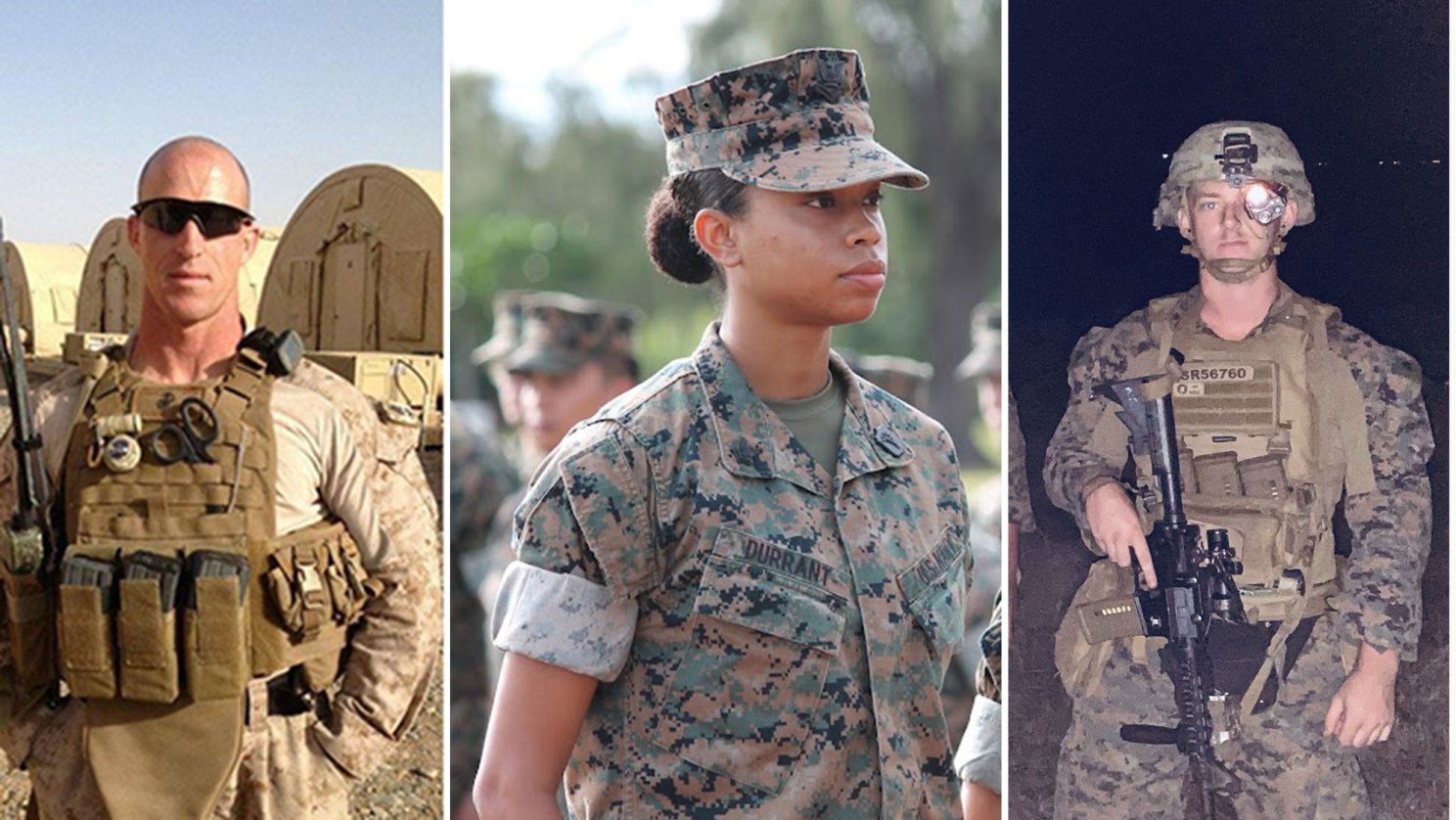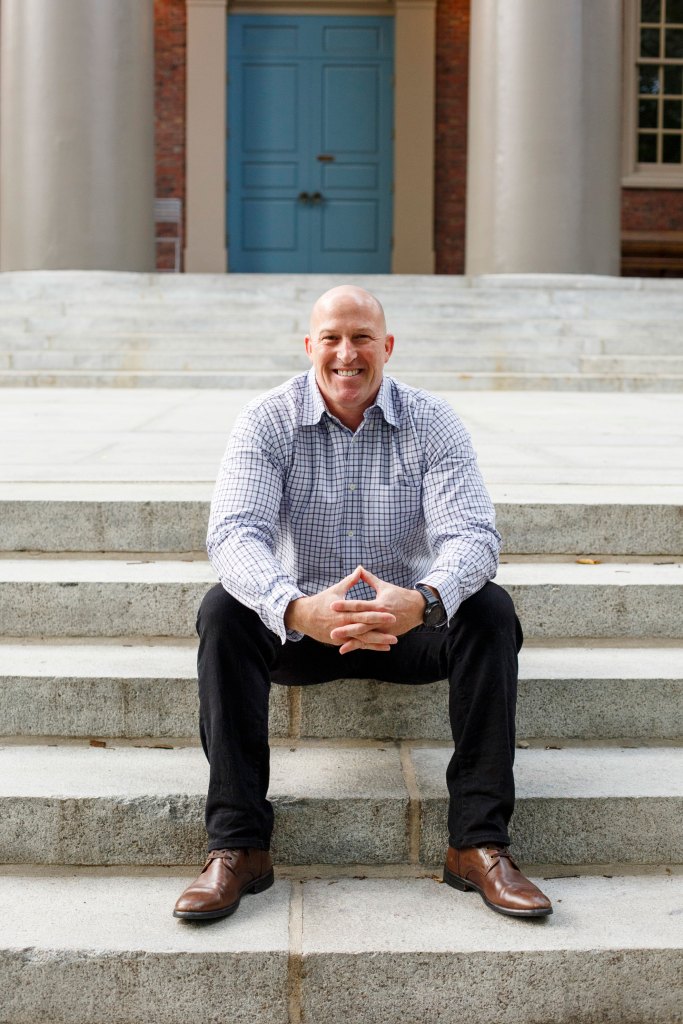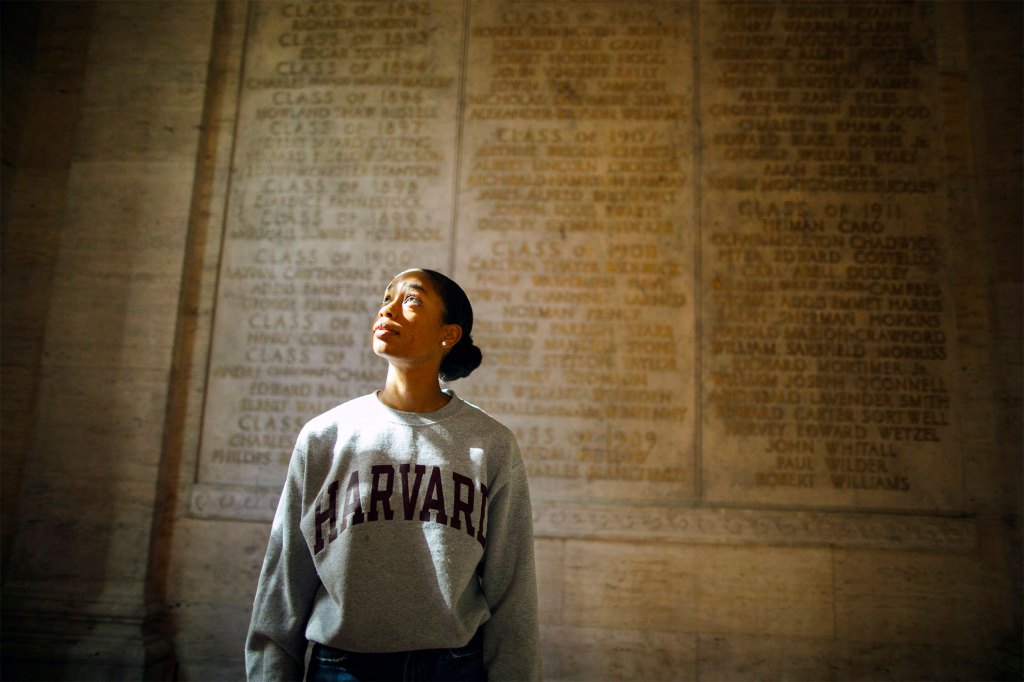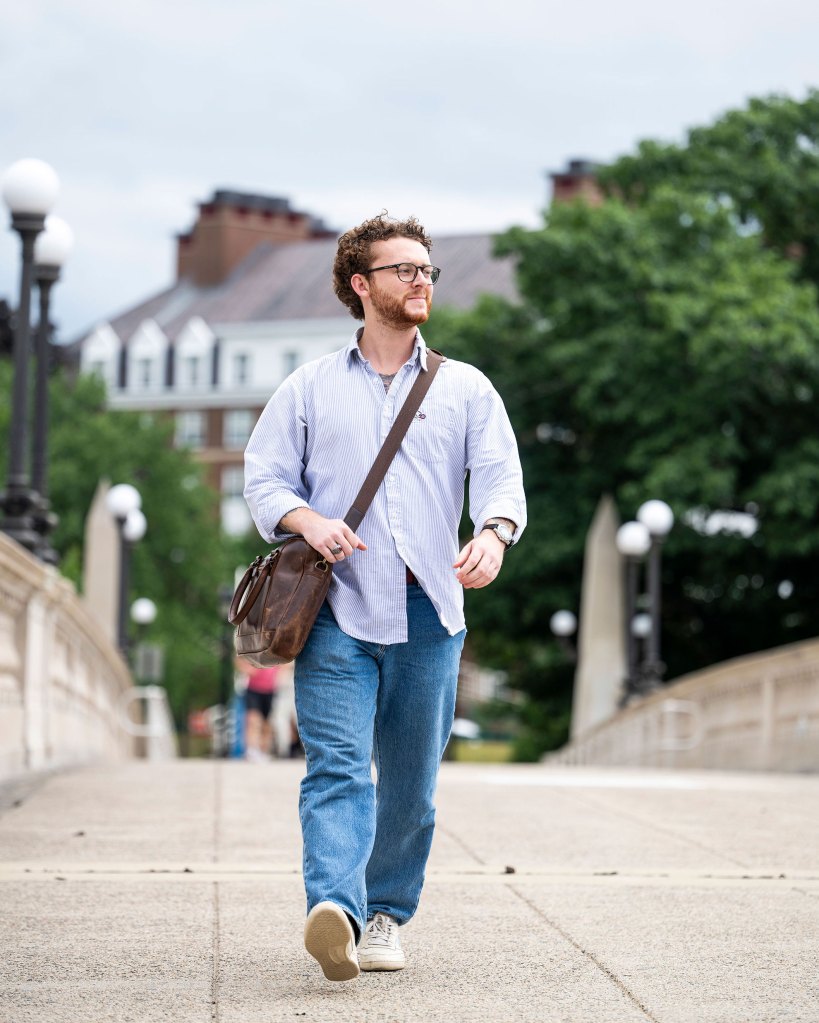The long Crimson line

Ed Somuk ’27 (from left), Alexandria Durrant ’28, and Shane Rice ’25.
Courtesy photos
Number of armed services veterans at Harvard on the rise as University ramps up outreach, support
Shane Rice ’25 was visiting his parents in Virginia and preparing for his first combat deployment. Alexandria Durrant ’28 was recovering after a 12-hour medical shift at a military base in Hawaii. And Ed Somuk ’27, a retired Marine, was busy potty-training the youngest of his three children.
“I looked at my phone, and all I could register was: ‘Congratulations. Harvard. Welcome Class of 2027,’” recalled Somuk, 49, a history concentrator who recently retired as a master sergeant after 26 years of service. “I had about six seconds to immerse myself in it. And then I had to get into that bathroom because I had a kid in there.”
The number of U.S. military veterans at the College has climbed in the last half-dozen years, thanks to stepped-up outreach and word of mouth. In 2018, a total of eight veterans were enrolled at the College. This fall, 21 started as first-year or transfer students, with a total of 78 current students having completed service in the armed forces.

Ed Somuk.
Photo by Grace DuVal
“Our veterans bring a diversity of perspective to Harvard College and make deeply valued contributions here,” said Joy St. John, director of admissions. “Additionally, public service is core to our mission, and time in the armed forces constitutes one of the most meaningful acts of service. Our commitment to recruiting and admitting more veterans is motivated by this.”
There is a thread of military service running through Harvard’s long history. That legacy is written all over Memorial Hall, its walls etched with the names of 136 Harvard associates lost during the Civil War. Likewise, the walls of Memorial Church bear hundreds of names representing faculty and alumni killed during World War I and World War II.
The presence of U.S. service members on campus began fading around the Vietnam era, but the trend started to reverse early in the 21st century. In 2005, Kit Parker, Tarr Family Professor of Bioengineering and Applied Physics, started bringing veterans to campus for summer opportunities via the National Science Foundation’s Research Experiences for Undergraduates program.
“We found these veterans brought an uncommon skill set in terms of maturity and work ethic,” remembered Parker, who is also a colonel with more than 30 years of service in the U.S. Army Reserve. “You’ve got to stay past midnight to get an experiment working? It’s no problem if you’ve been in the military. Night ops is what we do!”
Parker went on to join efforts by 2022 Harvard Medal winner Tom Reardon ’68 to improve support for veterans campuswide while easing obstacles for those applying. “Maybe they were late bloomers academically, but something about their military records revealed a potential, a talent, a desire, and certainly a focus,” Parker said.
Additional efforts were made to support soldiers returning from the American-led global war on terror launched after the attacks of Sept. 11, 2001. In 2006, Reardon, who served in the Army during Vietnam, established the Harvard Veterans Alumni Association, which seeks to strengthen connections between veterans on campus and in the alumni community. President Drew Faust announced in 2009 that the University would participate in the Yellow Ribbon Program, helping veterans to pay tuition costs exceeding what is covered under the Post-9/11 GI Bill.

Alexandria Durrant stands among the names of Harvard veterans in the Memorial Church.
Stephanie Mitchell/Harvard Staff Photographer
“At one point in the 2000s — between Harvard College students, Research Experiences for Undergraduates, and staff members I had hired — there was more combat experience in my laboratory than most infantry platoons in the Army,” Parker said.
The 2010s saw the University deepening its commitment. In 2014, Harvard started partnering with the Warrior-Scholar Project, a nonprofit offering free academic boot camps at top U.S. universities.
Attending a week-long session at Columbia University last summer gave Durrant, 24, the confidence to apply to Harvard. “It taught me to challenge myself and to understand that being an active-duty veteran is not a weakness; it’s actually a strength,” said the first-year who grew up in North Carolina and fell in love with healthcare while serving as a Navy hospital corpsman. “Right now I’m leaning toward a concentration in government with a secondary in global health and health policy. However, I still want to be ambitious and get the prerequisites for medical school.”
In 2017, Harvard College joined Service to School’s VetLink program, which provides free counseling for veterans applying to college. Somuk had mentally bookmarked its resources after seeing ads on social media. In 2021, he was freshly retired and living with his family near Fairbanks, Alaska, when his wife, an attorney with the Air Force JAG Corps, received orders to head to Hanscom Air Force Base about 20 miles northwest of Boston. Somuk, who grew up in Connecticut, gave Service to School a call.
“Have you ever thought about Harvard?” asked the first counselor he reached.
“I think of Harvard all the time,” Somuk remembered joking. “I think it’s a great institution that will never, ever let me inside their gates.” Today, the Dudley Co-op affiliate commutes to campus from Hanscom, often making the 40-minute trip multiple times per day while juggling courses and study halls with family obligations.
Veterans of militaries worldwide eventually organized a Harvard College student group, which was officially recognized in 2018. Rice, 25, was still stationed in Okinawa, Japan, when he stumbled upon the undergraduate-run organization five years ago. The anthropology concentrator and Cabot House resident remembered sitting in his barracks one day when he grabbed his phone and typed: “good schools USA.”

Shane Rice.
Photo by Jon Ratner
Harvard popped up. Rice, who was at the time a mortarman on his second deployment, did a bit more searching on the application process. “But never did I take it that seriously until I found Harvard Undergraduate Veteran Organization,” recalled Rice, who is studying abroad this semester at Trinity College in Dublin.
A former HUVO president even took the time to offer a bit of counsel over Zoom. “He was also a Marine, so we clicked over that,” Rice said. “That was the moment I realized this wasn’t just a pipe dream. People have done it!”
Another support arrived in 2020 with the appointment of the College’s first program manager for military student services. Craig Rodgers, Ed.M. ’96, a former reservist who matriculated in the Army ROTC program at MIT, works to counsel and connect veterans and ROTC cadets on campus.
“He does a really good job of letting us know what’s going on in the veterans’ community,” said Durrant, who underscored the comfort she finds in gathering with this group. “Sometimes it’s nice to just be able to talk in military jargon with people who understand.”
The College isn’t the only Harvard School with strong U.S. military representation. At the Kennedy School this fall, 76 students are on active duty or veterans. The Law School has 70, and the Extension School counts 423 veterans or active-duty U.S. military members taking courses this semester.
Parker emphasized that more can be done to support this growing population. Adding accessible family housing options near campus would make admission possible for a greater number of veterans with physical disabilities. Bolstering mental health supports would serve those dealing with post-combat stress. He called for a greater awareness of how the Americans With Disabilities Act uniquely impacts war veterans.
But most will find the campus welcoming, with military training increasingly understood as an academic asset, he said. “It’s a great time to be a veteran at Harvard.”




